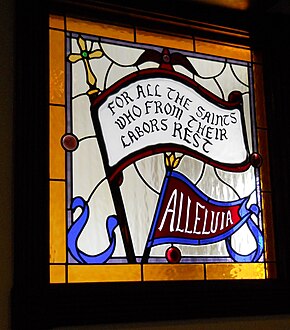For All the Saints
For All the Saints is an English-language hymn of Anglican provenance. It was written as a processional song by Bishop William Walsham How (first Bishop of Wakefield ) and first reprinted in Earl Nelson's collection Hymns for Saint's Days, and Other Hymns in 1864. The song is mainly sung on the feast of All Saints' Day .
melody
Originally the text was sung to the melody Sarum by the Victorian composer Joseph Barnby . It wasn't until the English Hymnal was published in 1906 that a new by Ralph Vaughan Williams ; the composer named this melody Sine Nomine ("without a name"). It has been described as "one of the most beautiful hymn melodies of the [twentieth] century".
text
Content and form
The text is a song of thanks to Jesus Christ for the saints , for their example and the strengthening communion with them. The apostles are named individually in stanza 3 , the evangelists in stanza 4 and the martyrs in stanza 5 . These stanzas are often left out.
The shape is unusual. Each stanza consists of three five-part , masculine , iambic lines with the rhyme scheme[aaa]as well as the Alleluia call.
Original version (1868)
1. For all Thy Saints, who from their labor rest,
Who Thee by faith before the world confessed,
Thy Name, O Jesu, be for ever blest.
Alleluia!
2. Thou wast their Rock, their Fortress, and their Might;
Thou, Lord, their Captain in the well-fought fight;
Thou, in the darkness drear, their light of light.
Alleluia!
3. For the Apostles' glorious company,
Who, bearing forth the Cross o'er land and sea,
Shook all the mighty world, - we sing to Thee
Alleluia!
4. For the Evangelists, by whose blest word,
Like fourfold streams, the garden of the Lord
Is fair and fruitful, - be Thy Name adored.
Alleluia!
5. For Martyrs, who with rapture-kindled eye
Saw the bright crown descending from the sky,
And died to grasp it, - Thee we glorify.
Alleluia!
6. Oh! May Thy soldiers, faithful still and bold,
Fight as the Saints who nobly fought of old,
And win, with them, the victors' crown of gold.
Alleluia!
7. O blest Communion! Fellowship divine!
We feebly struggle, they in glory shine;
Yet all are one in Thee, for all are Thine.
Alleluia!
8. And when the strife is fierce, the warfare long,
Steals on the ear the distant triumph song,
And hearts are brave again, and arms are strong.
Alleluia!
9. The golden evening brightens in the west:
Soon, soon, to faithful warriors comes the rest;
Sweet is the calm of Paradise the blest.
Alleluia!
10. But lo! there breaks a yet more glorious day:
The saints triumphant rise in bright array;
The King of Glory passes on His way.
Alleluia!
11. From earth's wide bounds, from ocean's farthest coast,
through gates of pearl streams in the countless host,
Singing to Father, Son, and Holy Ghost
Alleluia! Amen.
variants
The beginning is originally "For all thy saints". In some versions, "far off we hear" is sung instead of "steals on the ear" (verse 8). There are numerous other smaller variants.
German versions
Praise to god
The Catholic Praise to God (2013) contains a five-verse adaptation of For All the Saints - “For all saints in glory”, written by Günter Balders in 1998 and Christoph Bächtold in 2001/2004 (No. 548).
Evangelical hymn book
The melody can be found in the Evangelical Hymn book under number 154. The text ( Lord make us strong in courage, who professes you ) was however newly composed by Anna Martina Gottschick in 1972 without reference to the English text. In 1988 Jürgen Henkys created an additional stanza that is to be used on memorial days of witnesses to the faith and that summarizes the English text:
We adore you with all saints.
They led the way on the
path of faith and rest in you who won our victory.
Alleluia, alleluia!
This version was also included in the praise of God (No. 552).
Hymn book of the United Methodist Church
In 2000, Walter Klaiber created another version of the text, a five-stanza song of thanks, which can be found in the hymn book of the United Methodist Church under number 98:
Thank you God for the time of my life,
for your love and for your company.
My praise praises you, my song is dedicated to you.
Alleluia, alleluia!
literature
- Richard Clothier: A Heritage of Hymns . Herald Publishing House, Independence MO 1996, pp. 156-158.
Remarks
- ^ Clothier
- English-language Wiktionary :

